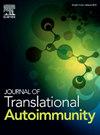The role of soluble CD40L in autoimmune diseases
IF 3.6
Q2 IMMUNOLOGY
引用次数: 0
Abstract
CD40−CD40L is essential for immune system modulation because it coordinates both adaptive and inflammatory responses.
Systemic lupus erythematosus, multiple sclerosis, inflammatory bowel disease, thrombocytopenic purpura, and rheumatoid arthritis are among the autoimmune illnesses in which it is especially prominent. Thus, the CD40−CD40L axis is a significant therapeutic target, despite the fact that its inhibition was first constrained by thromboembolic adverse effects.
New therapeutic approaches, such as nanotechnological methods and new-generation monoclonal antibodies, have been developed as a result of recent research with the goal of enhancing therapy efficacy and safety. This study opens up new avenues for the treatment of autoimmune illnesses by examining the pathophysiological consequences of CD40−CD40L and reviewing new treatments that target this pathway.

可溶性CD40L在自身免疫性疾病中的作用
CD40−CD40L对免疫系统调节至关重要,因为它协调适应性和炎症反应。系统性红斑狼疮、多发性硬化症、炎症性肠病、血小板减少性紫癜和类风湿关节炎是其特别突出的自身免疫性疾病。因此,CD40−CD40L轴是一个重要的治疗靶点,尽管它的抑制首先受到血栓栓塞不良反应的限制。新的治疗方法,如纳米技术方法和新一代单克隆抗体,是近年来研究的结果,其目的是提高治疗效果和安全性。本研究通过检查CD40−CD40L的病理生理后果和回顾针对该途径的新治疗方法,为自身免疫性疾病的治疗开辟了新的途径。
本文章由计算机程序翻译,如有差异,请以英文原文为准。
求助全文
约1分钟内获得全文
求助全文
来源期刊

Journal of Translational Autoimmunity
Medicine-Immunology and Allergy
CiteScore
7.80
自引率
2.60%
发文量
33
审稿时长
55 days
 求助内容:
求助内容: 应助结果提醒方式:
应助结果提醒方式:


